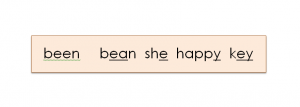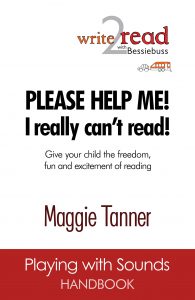
Let me guess: you have spoken to your daughter’s teacher about her reading. He has explained that although she ‘knows her sounds’, she finds decoding rather tricky. Now you’re wondering if reading has become some kind of espionage game that no one told you about.
Well no, it’s not about espionage, but it is about decoding text. Sorry, I used that word again!
So What is Decoding?
Decoding in reading is simply turning symbols (letters) into sounds, e.g. we look at each symbol in the word dog, and say the appropriate sounds d o g, and then push the three sounds we hear together, to hear the word dog. This is also referred to as ‘sounding out’ or ‘segmenting’ a word.
Decoding is tricky, because it requires more than your child being able to identify the symbols (letters) in a word. She has to say each sound and push them together (‘blend’ them) to be able to hear the word. In more complex words she also has to be able to recognise symbols that contain two or more letters like:

How do you deal with decoding?
When you read an unfamiliar word, you probably go through a simple process of saying each sound to yourself, working out the word as you go along.
This is possible, because you have practised the skills involved, so many times. Fortunately, you also have a good idea how to group the letters together to read each difficult sound.
These are the skills your struggling child needs, to be able to decode words.
Decoding can be a real problem for strugling readers and Educational Psychologists often report, that the children they test ‘have poor decoding skills’. What they don’t add is that decoding skills are about more than a child ‘knowing her sounds’.
When I test children, I sometimes find that they are unable to decode words, even if they recognise the individual letters (symbols) that make up a word. One of my students illustrated this problem very well.
Sarah Struggled with Decoding
Sarah was 7 when I tested her. She was extremely able and showing huge potential at school. However, she had no idea how to do this thing called ‘reading’, even though she ‘knew her sounds’.
I often wonder why teachers say that children ‘know their sounds’; they must do, because they wouldn’t be able to speak, if they didn’t!
I tested Sarah and was somewhat surprised and amused to hear her response to the word cat. She said the sounds correctly: c a t followed by the word dog.

This sounded quite funny at the time, but told me exactly where to start to help Sarah. It demonstrated that no one had explained to her that she had to say the three sounds c a t, so that she could LISTEN for the word. If you say out loud c a t, as small sounds, you will hear what I mean.
Maybe you have listened to your child struggle to ‘sound out’ or decode unfamiliar words; she says each sound correctly: p e t, but doesn’t know how to get to the word pet. Please don’t despair, in her struggle she is letting you know that she doesn’t know how to decode and needs your help. Initially, you can simply tell her to ‘LISTEN’ as she says the sounds!
If she still cannot do this, you may need to play ‘Listening Fingers’ (see my Handbook).
Decoding Requires Recognition of Symbols that need 2 or more Letters:
Another reason why decoding is difficult, is that some symbols for the sounds in our language, require two or more letters. This is why it is so important for early readers to master easy words before they try more difficult ones.
The following words will help to illustrate the problems of decoding.

As you can see, the words clip has four letters and four sounds. However, the words chip has four letters and three sounds, because the sound ch, is made up of the two letters c & h. A child has to be aware of this, to be able to decode.
Try the following decoding game, which will help to illustrate how difficult decoding can be:

Decoding gets harder with our Tricky Spelling System!
Why is spelling so difficult? There are several reasons, but the most obvious one is that English is made up of five languages, and so we spell the same sound, in lots of different ways! The sound ee is a good example:

Sound or is the most difficult sound, because it has 11 different spellings. A child struggling with reading will not be able to decode tricky words like saw, shore, warm, August, if she is not introduced to these different spellings?
Helping your Child with Decoding
When you are listening to you child read her book, and she struggles with a word like warm, you can help her. She will probably know w and say w, you can point to ar and say ‘try sound or’. Sound m will be no problem, and then she will hear the word warm.
I know you are used to thinking of ar as the sound you hear in car, but if you listen to the word warm, you can hear that it is sounded or. This is another reason why decoding can be a problem.
There is a lot more valuable information on blending, segmentation and decoding in my book and in my Blog Post on segmentation.
Please Help Me? I Really Can’t Read!

This is the book I have written, to try to make it easier for you to help your child with reading. I watched my child struggle many years ago, and couldn’t help him, because I didn’t understand why decoding was so difficult. My inability to help him, and my subsequent work has taught me a lot about decoding.
Next Blog: ‘How to help your child to Blend and Segment.’